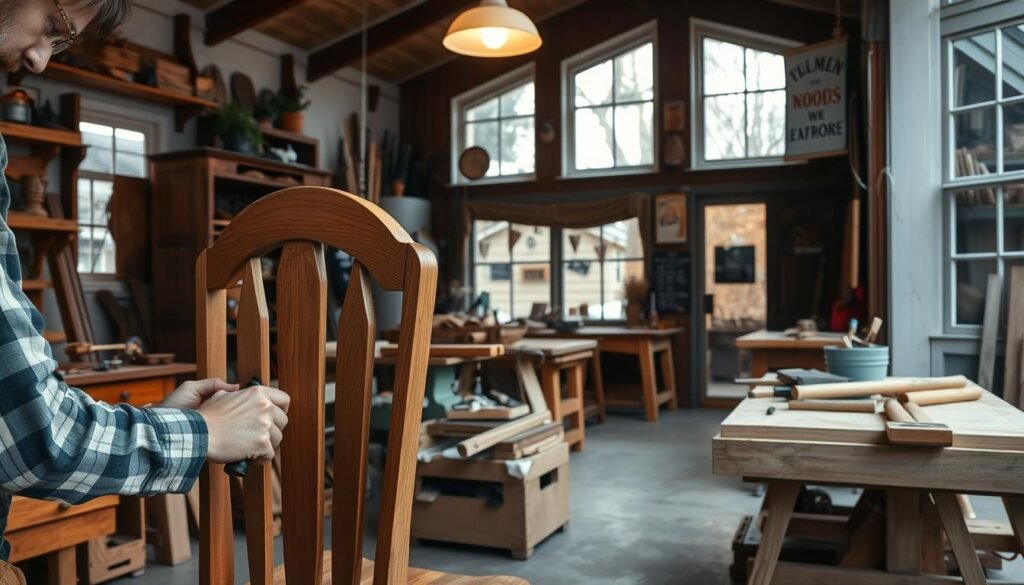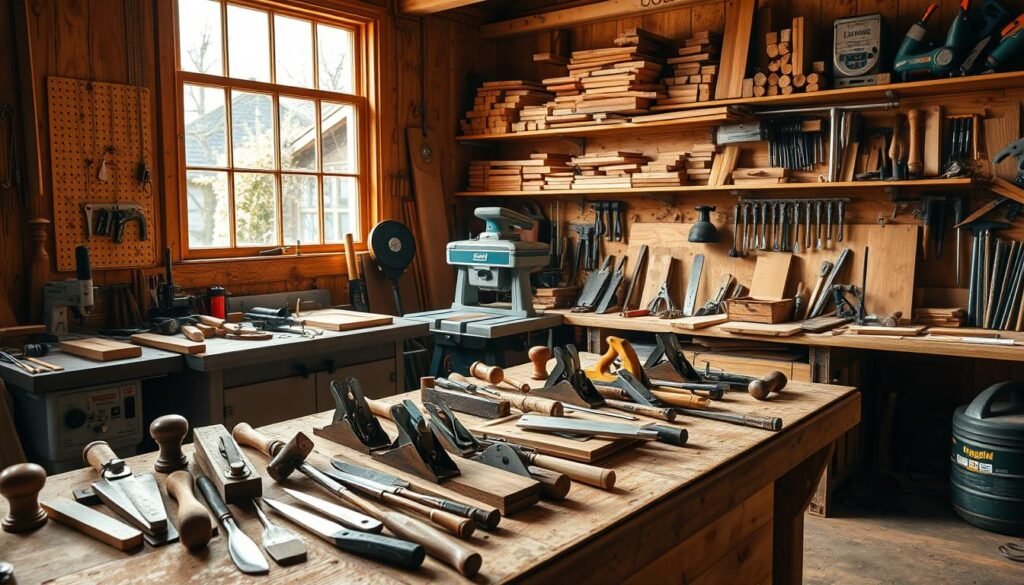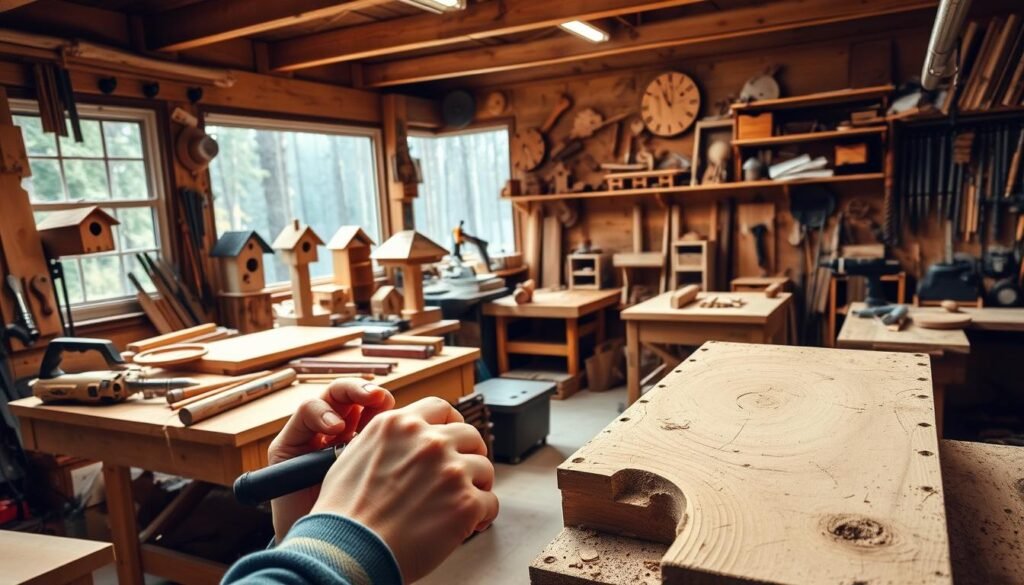Have you ever looked at a handmade piece and thought, “I could make something like that?” The skills behind every detail come from learning and practicing. If you’re starting out or already skilled, there are woodworking classes near me for you. These classes can improve your skills and connect you with a community of woodworkers.
From beginner woodworking courses to advanced classes, this guide helps you find the right one. It shows you the best woodworking education in your area.
Key Takeaways
- Discover local woodworking classes tailored to various skill levels, from novice to advanced craftsmen.
- Learn about the importance of community connections in the woodworking world and how classes can facilitate that.
- Understand the essential factors to consider when choosing a woodworking course, ensuring a fit that’s just right for you.
- Gain insight into the tangible benefits of enrolling in a woodworking class, beyond the acquisition of technical skills.
- Explore the diversity of options available, enabling you to dive deeper or broaden your expertise in woodworking.
Why Learn Woodworking: The Benefits and Skills You’ll Gain
Ever thought about the joy of learning woodworking? It’s like turning a simple wood piece into art or useful furniture. You gain more than just a product; you develop woodworking skills that improve your precision, creativity, and problem-solving. It’s not just about cutting and putting things together. It’s about seeing a project grow from raw material to something amazing.
This journey not only brings personal satisfaction but also boosts your mental health.
Now, let’s explore the DIY woodworking benefits. Did you know it can lower stress and boost happiness? Woodworking requires focus, which clears your mind from daily stress. It lets you live in the moment and work towards a goal.
Also, DIY woodworking skills can lead to selling your creations. The joy of turning your idea into reality is priceless. But let’s dive deeper into what you’ll gain:
| Skill | Benefits |
|---|---|
| Precision | Improves your attention to detail, important in woodworking and daily tasks. |
| Creativity | Boosts your brain to think creatively and innovate. |
| Problem-Solving | Sharpens your mind by solving complex problems. |
| Physical Durability | Makes your body stronger and more agile for handling tools. |
Every project you start is a chance to learn. You’ll face challenges, but they teach you to be resilient and adaptable. So, if you’re looking for a new hobby, consider woodworking. It’s not just a hobby; it’s a journey that enriches your life in many ways.
Exploring the Different Types of Woodworking Courses Available

The world of woodworking has many educational paths for everyone. Whether you’re starting out, improving your skills, or focusing on a specific project, there’s a course for you. Let’s explore the options, from beginner tutorials to specialized workshops.
Beginner Woodworking Courses
Beginner courses are great for starting your woodworking journey. They teach you the basics, safety, and how to handle your first projects. It’s like taking your first step into a world of creativity and skill.
👉👉 Explore TEDS Woodworking Plans Now 16,000 detailed woodworking plans,and take your next step with confidence.
Advanced Woodworking Lessons
Advanced lessons are for those who know the basics well. They focus on complex techniques and tools. You’ll learn to improve your precision and artistic skills, taking your woodworking to the next level.
Specialized Workshops for Specific Projects
Specialized workshops are perfect for those with a specific project in mind. They cover everything from custom furniture to advanced carving. You’ll get in-depth training from experts in their field.
Each class offers something unique, tailored to different woodworking needs. Beginner courses lay the groundwork, advanced lessons refine your skills, and specialized workshops focus on specific areas. No matter your goals, there’s a course to help you achieve them.
Woodworking Classes Near Me: How to Find the Best Options

Looking for the perfect woodworking classes for adults and woodworking classes for kids can be tough. It’s like searching through a dense forest. I’m here to help you find local woodworking workshops that match your goals and feel like a community.
Start by checking out what others say about woodworking classes for adults. Look at reviews and forums. They show how well classes teach and let you practice, which is key for learning woodworking.
For kids, woodworking classes for kids should focus on safety, fun, and learning the basics. Try to visit these classes in person. Seeing the class can tell you if it’s a good fit for your child.
To find the best local woodworking workshops, check out local craft fairs and community boards. Instructors often show off their students’ work and share workshop times. This gives you a good idea of the class quality and community vibe.
In short, finding the right woodworking class is like picking the perfect wood for your project. It should feel just right. Happy crafting!
Finding the Right Woodworking Class: What to Look For

When you’re eager to learn woodworking, the quality of your education matters a lot. You might be looking at woodworking courses, lessons, or schools in [city]. To find the right fit, consider a few key things.
👉👉 Explore TEDS Woodworking Plans Now 6,000 detailed woodworking plans,and take your next step with confidence.
The skills of your instructor are very important. A good teacher shares their knowledge and guides you through tough projects. They should have lots of experience in woodworking.
The size of the class also matters. Smaller classes offer more one-on-one attention. This helps you learn faster and become more confident in your skills.
Having the right tools and facilities is essential. Good tools and a professional workshop let you practice in a real-world setting. This is where you learn by doing.
- Expert Instructors: Look for professionals with extensive experience and a passion for teaching.
- Small Class Sizes: Ensure you’re not just another face in the crowd.
- Quality Facilities: Facilities equipped with modern tools enhance learning.
Finding the right woodworking class is more than just learning to cut wood. It’s about connecting deeply with the craft. By choosing well, you start a rewarding journey in woodworking, backed by great guidance and resources.
Online Vs. Offline Woodworking Training: Pros and Cons

Deciding how to learn woodworking can be tough. You might choose online training for its ease and flexibility. Or, you might prefer in-person classes for a hands-on experience. Both options have their own perks. Let’s explore what each offers to help you decide what’s best for you.
👉👉 Explore TEDS Woodworking Plans Now 6,000 detailed woodworking plans,and take your next step with confidence.
Benefits of Online Woodworking Courses
Online woodworking courses let you learn at your own pace. They’re great for those with busy lives. You can watch video tutorials as many times as you need to understand the techniques.
This method is perfect for those who like to learn at their own speed. You can take your time without feeling rushed.
Advantages of In-Person Workshops
Offline woodworking classes offer direct interaction with experts and other learners. You get immediate feedback and hands-on practice. This is key for mastering complex skills.
You also get to try out different tools and machines. This might not be possible at home. Plus, you’ll meet others who share your interests, creating a supportive community.
Your choice between online and offline woodworking training depends on your learning style and goals. Both options can greatly improve your woodworking skills and confidence.
How to Get the Most Out of Your Woodworking Class

To really maximize your woodworking class experience, getting ready is essential. Before you go to class, know what you want to learn. Are you aiming to master certain skills or dive into DIY projects? Your goals will help you focus and ask the right questions.
Learning doesn’t stop when class ends. The real fun starts when you practice at home. Turn what you’ve learned into real projects. Each project you make is a step towards becoming better at woodworking.
- Ask clear, focused questions to understand better.
- Look for feedback and welcome helpful criticism.
- Keep practicing what you’ve learned to remember it well.
Show your excitement in every project you do. See how each lesson becomes a base for future projects. With the right mindset and effort, every woodworking class can boost your skills a lot.
Spotlight on TEDS Woodworking Courses: Learn at Your Own Pace
Starting or improving your woodworking journey is easier when you can learn at your own pace. TEDS woodworking courses offer this flexibility. They are perfect for hobbyists and experienced craftsmen alike, providing resources to enjoy woodworking from home.
TEDS woodworking courses are ideal for those who want to dive deep into woodworking. You can learn at any time, whether it’s early morning or late at night. This way, you can fit your learning into your busy schedule.
Thousands of Plans and Tutorials
TEDS is unique in the at-home woodworking training world. They offer thousands of woodworking plans. Each plan has step-by-step instructions, making it easy to follow, no matter your skill level. You can build anything from birdhouses to complex furniture.
👉👉 Explore TEDS Woodworking Plans Now 16,000 detailed woodworking plans,and take your next step with confidence.
Why Choose TEDS for Your Woodworking Journey
Choosing TEDS means getting a wide range of quality courses. They teach you both practical skills and the finer points of woodworking. The clear visuals and detailed guidance help ensure your projects are successful. Plus, it’s affordable, making TEDS a great choice for learning at home.
Whether you’re new to woodworking or want to improve, TEDS has everything you need. They provide the tools for success on your creative journey.
Local Woodworking Workshops: A Gateway to the Community
Exploring local woodworking classes is more than learning new skills. These places are lively spots where people with a shared love for crafts gather. Here, you can join a woodworking community and feel a sense of belonging.
In community woodworking workshops, friendships grow over sawdust and stains. These friendships lead to projects that go beyond the workshop. You become part of a tradition of crafting and creativity in your area.
Going to local workshops lets you get to know your area’s woodworking scene. You learn about the materials, styles, and techniques used locally. This knowledge connects your skills to your community’s cultural heritage.
Whether you’re new to woodworking or have lots of experience, local woodworking classes are for you. They help you grow your skills and connect with your community. Don’t miss out on this enriching journey.
Preparing for Your First Woodworking Class: A Checklist
Starting your DIY woodworking start is both thrilling and a bit scary. When you join beginner woodworking courses, being ready is key. You need the right tools and materials. Here’s a checklist to help you get ready for success.
Imagine stepping into a workshop, filled with the smell of wood shavings. It’s exciting, but without the right prep, it can quickly become overwhelming. Here’s how to get ready:
- Becoming Familiar with the Basic Tools: Every craftsman starts with basic tools. Make sure you have a hammer, saw, measuring tape, and safety gear. These are must-haves for most beginner woodworking courses.
- Packing the Right Materials: Bringing your own materials can be very helpful. It lets you get used to the types of wood and materials you’ll work with.
- Setting Realistic Goals: What do you hope to achieve in your course? Setting clear goals helps you learn better and stay focused. Maybe you want to make a birdhouse or a picture frame. These are great first projects.
- Reading Up Beforehand: Knowing some theory can really help. Learning the basics of woodworking boosts your confidence and understanding in class.
Getting off to a good start is important. With this checklist, you’ll not just be in a class; you’ll be learning to make things. So, get your tools ready and set your goals. Your DIY woodworking start is about to get very exciting!
Conclusion
Starting a woodworking adventure is exciting. It’s filled with the smell of sawdust and the sound of chisels. You get to see your projects come to life.
We explored woodworking classes together. We talked about how they can improve your DIY skills and connect you with others. We covered different types of courses and what to look for in a class.
Whether you’re new or experienced, remember, every piece you make tells your story. By choosing the right course and setting goals, you’re ready to succeed. The patience, precision, and creativity you develop are valuable life skills.
We hope you’re ready to find the perfect woodworking class. Start your next project knowing you’re not just making furniture. You’re building a legacy of skill and passion.
Your commitment to woodworking is an investment in a lifelong craft. It offers both challenges and rewards. So, pick up your tools and let’s create something amazing!
👉👉 Explore TEDS Woodworking Plans Now 16,000 detailed woodworking plans,and take your next step with confidence.
👉👉Mastering Kitchen Cabinet Woodworking: A Hands-On Guide
👉👉DIY A-Frame Chicken Coop: Cozy Home for Your Flock
👉👉DIY Woodworking Shelves:Transform Your Space with Custom Storage

